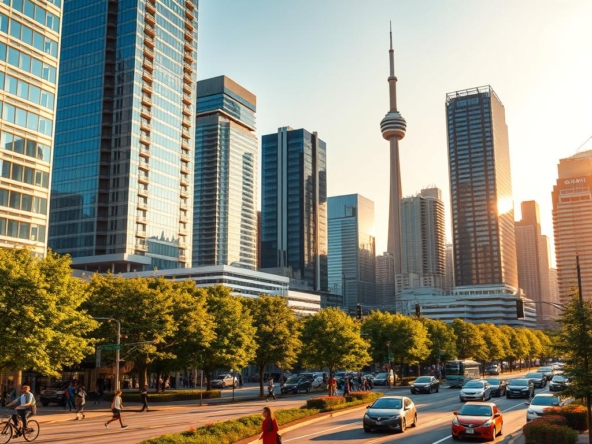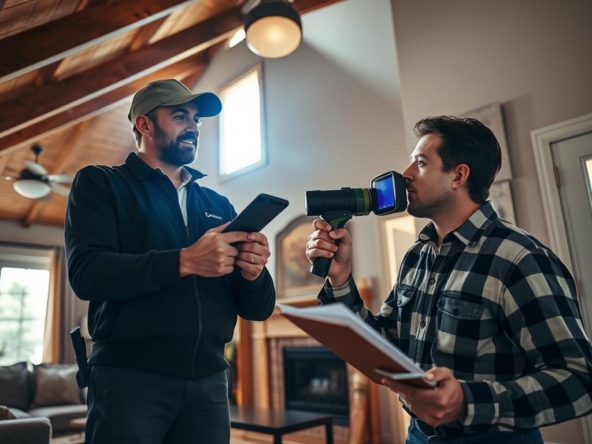Toronto is Canada’s biggest and most lively city, offering a great chance for first-time homebuyers. It’s perfect for young professionals wanting to start their life or investors aiming to grow their portfolio. This guide will give you the key knowledge and strategies to buy your first home in Toronto with confidence.
The Toronto real estate market is always changing, with many properties and areas to check out. You’ll find everything from modern high-rise condos to cozy single-family homes. With the right advice, you can easily find a property that matches your lifestyle, budget, and future plans.
Key Takeaways
- Understand the unique challenges and opportunities of the Toronto real estate market
- Establish your home buying goals and budget to guide your search
- Explore different neighborhoods and property types to find the perfect fit
- Leverage the expertise of a knowledgeable real estate agent to navigate the process
- Familiarize yourself with the tax implications and closing costs associated with a Toronto home purchase
Introduction: Navigating the Toronto Real Estate Market
Toronto has become a top spot for property investment in recent years. Its booming economy, diverse population, and thriving culture draw homebuyers and investors. But, the Toronto real estate market can be tough to navigate, especially for first-timers.
Why Toronto is a Hotspot for Property Investment
The Toronto real estate market keeps going up, making it a great choice for property investment. The city’s strong job market and growing population push up demand and prices. Toronto’s role as a global financial center and more international buyers have boosted the real estate market.
Understanding the Unique Challenges of Buying in Toronto
- High housing costs: Toronto’s average home price is very high, making it one of Canada’s priciest markets.
- Intense competition: With not enough homes and lots of buyers, bidding wars and multiple offers are common, making it hard to get your dream home.
- Strict mortgage regulations: New rules and stress tests from the government make it harder for some buyers to get a mortgage.
- Rapidly changing market conditions: Toronto’s real estate market changes fast, with prices and trends shifting quickly. It’s important for buyers to stay updated and act fast.
Dealing with these challenges needs a good understanding of Toronto’s real estate and a solid plan for homeownership. Being informed and proactive helps you navigate the Toronto real estate market and find the perfect property.
Establishing Your Home Buying Goals and Budget
As a future homebuyer in Toronto, setting your goals and budget is key. This step helps you move through the competitive market. It also makes sure your financial choice fits your long-term dreams.
Start by thinking about what you want in a home. Do you dream of a big single-family home, a snug condo, or a quaint townhouse? Think about the number of bedrooms and bathrooms you need. Also, consider the outdoor space and amenities you want. Pick neighborhoods in Toronto that match your lifestyle and likes.
Then, look at the money side of buying a home. Figure out your real estate budget and the highest price you can pay. Use your income, savings, and any debts to guide you. Make sure your budget fits the prices in Toronto.
To improve your financial planning, consider these steps:
- Get a pre-approval from a lender to see how much you can borrow.
- Look at different mortgage types, like fixed-rate or variable-rate loans, and see how they affect your payments.
- Add costs like property taxes, upkeep, and utilities to your budget to cover all expenses.
By setting clear homebuying goals and a solid real estate budget, you’re ready to confidently navigate Toronto’s housing market. You’ll make a choice that fits your financial and lifestyle goals.
Getting Pre-Approved for a Mortgage
Getting a mortgage pre-approval is a key step in buying a home in Toronto. It shows you’re ready financially and helps you know how much you can borrow. With a mortgage pre-approval or home loan pre-approval, you can confidently look for a property and stick to your budget.
Factors Lenders Consider for Pre-Approval
Lenders look at several things when they review your mortgage pre-approval application. They check your credit score, income, job history, and debts. They want to make sure you can pay your monthly payments on time and meet their lending rules.
| Lender Consideration | Importance for Pre-Approval |
| Credit Score | A higher credit score shows you’re good with credit and financially responsible. This helps you get pre-approved. |
| Income and Employment | A steady income and a stable job history tell lenders you can make your mortgage payments. |
| Debt-to-Income Ratio | Lenders check your debts and monthly payments to make sure you can handle a new mortgage. |
Tips for Improving Your Chances of Pre-Approval
To get a good mortgage pre-approval in Toronto, try these tips:
- Check and fix your credit score by looking at your credit report and clearing up any issues.
- Pay off your debts to keep your debt-to-income ratio low.
- Have all your financial documents ready, like pay stubs, tax returns, and bank statements.
- Choose a trusted mortgage lender who can help you with the Toronto mortgage process and offer advice.
By knowing what lenders look for and improving your finances, you can boost your chances of getting a good mortgage pre-approval. This puts you in a strong position to find and buy your dream home in Toronto.
Finding the Perfect Neighborhood in Toronto
Choosing the right Toronto neighborhood is key when buying property in this vibrant city. The area you live in affects your life, commute, and the feel of the neighborhood. Let’s look at what to think about when picking the best place to live.
Proximity to Amenities and Public Transportation
Look at how close your Toronto neighborhood is to things you need like shops, restaurants, and healthcare. Being close to public transport, like subway and buses, makes life easier and cuts down on car use.
- Check how close you are to local shops and eateries
- See how easy it is to get around with public transport
- Think about how walkable and bike-friendly the area is
Community Vibe and Character
The feel and Toronto community factors of a neighborhood matter a lot. Things like the buildings, the mix of cultures, and how active the community is shape the area’s life. Take time to visit different spots to see if they feel right for you.
- Look at the area’s buildings and design
- See how diverse and active the community is
- Check if the area’s vibe matches what you like
By looking at these important points, you can find the best Toronto neighborhood for you. Remember, where you live affects your everyday life. So, take your time to find a community that meets your needs and dreams.
Buying Property in Toronto: Key Steps and Considerations
Buying a property in Toronto is exciting but complex. It’s important to know the key steps and what to consider. From finding the right property to dealing with legal and financial parts of buying, each step needs careful planning.
We’ve outlined key considerations for buying property in Toronto:
- Property Search: Start by picking a location, property type, and budget. Use online tools and a real estate agent to find listings that meet your goals.
- Mortgage Pre-Approval: Get pre-approval from a lender to know how much you can borrow. This helps you stand out in Toronto’s competitive market.
- Neighborhood Evaluation: Research neighborhoods you like. Look at how close they are to shops, how long it takes to commute, and what the community is like.
- Property Inspection: A professional home inspector can check the property’s condition. They’ll spot any problems and advise on repairs or updates you might need.
- Legal and Financial Review: A real estate lawyer can review the purchase agreement and handle the legal and financial parts of buying.
- Offer Negotiation: Make a strong offer based on the market and your timeline. Be ready to negotiate.
- Closing and Possession: After finalizing the deal, complete paperwork, transfer funds, and get ready for your new home in Toronto.
Knowing these steps and considerations will help you through the Toronto home buying process. It’s important to make a choice that fits your goals and budget. Getting help from experts like real estate agents and lawyers is key to a smooth and successful purchase.
“Purchasing a property in Toronto is a significant investment, but with the right preparation and guidance, it can be a highly rewarding experience.”
Working with a Real Estate Agent
Looking for a home in Toronto can feel overwhelming. But, the right Toronto real estate agents can change everything. A skilled Toronto buyer’s agent offers great advice and support during your search.
Benefits of Hiring a Buyer’s Agent
A Toronto buyer’s agent brings many benefits:
- They know the Toronto market well, including trends, prices, and what’s available.
- They’ll listen to what you want and search for the perfect property for you.
- They’re experts at negotiating to get you the best deal.
- They guide you from the start to the end, making sure everything goes smoothly.
Questions to Ask When Interviewing Agents
When picking a Toronto real estate agent, ask important questions. This helps you find the right one. Ask:
- How long have you been an agent, and what successes have you had?
- How do you communicate, and how often will you update me?
- Can you give me references from past clients?
- Do you know a lot about the areas or types of properties I like?
- What’s your commission, and are there any extra fees?
Finding the right Toronto buyer’s agent can make buying a home easier and less stressful. It’s key in Toronto’s tough market.
Understanding the Different Types of Properties in Toronto
Buying your first property in Toronto means you have many options. You can choose from modern condos to big single-family homes. Each type fits different lifestyles and budgets. Knowing the good and bad of each option helps you decide wisely.
Condos vs. Houses: Pros and Cons
Toronto condos are getting more popular. They’re a good way to start in real estate because they’re cheaper. They usually need less upkeep and offer things like gyms and pools. But, they might have less space and privacy than houses.
Houses give you more room, a yard, and can be a better investment. But, they cost more to maintain and have higher taxes. They also mean more work as a homeowner. It’s important to think about what you want and can afford before choosing between condos and houses.
| Condos | Houses |
| Lower purchase priceReduced maintenance responsibilitiesAccess to shared amenitiesPotentially better for first-time buyers | More living space and privacyPotential for greater long-term investment valuePrivate outdoor spaceOpportunity for customization and renovations |
Whether you like the easy living of a condo or the room of a house, think about what’s best for you. Weighing the good and bad of each type will lead you to the right choice.
Making an Offer and Negotiating the Deal
In Toronto’s competitive real estate market, making a strong offer and negotiating well is key to getting your dream home. Knowing what makes a good offer can help you stand out in this fast-paced market.
Components of a Strong Offer in Toronto’s Competitive Market
When you make an offer on a Toronto property, several things can make your bid stand out. A successful Toronto real estate offer usually has:
- A purchase price that matches the property’s value and market trends
- A big deposit to show you’re serious and trustworthy
- Flexible closing dates that fit the seller’s schedule
- Minimal or no conditions, like financing or inspections, to make the deal smoother
- A thoughtful letter of intent that shows why you want the property
Handling Toronto property negotiations needs a smart plan and understanding the market. With the help of an experienced real estate agent, you can make a Toronto home buying offer that catches attention and helps you succeed.
“In Toronto’s real estate market, the right offer can make all the difference. With careful planning and a well-executed negotiation strategy, you can secure the property of your dreams.”
For a successful offer and negotiation in Toronto’s real estate, be prepared, flexible, and creative. By grasping the market’s unique challenges and chances, you can aim for a good outcome and move closer to owning a home.
Closing the Deal and Moving In
As you get close to buying a home in Toronto, the closing process is the last step before you move in. It’s a key part of the journey that includes legal steps and tasks. Knowing what happens in the Toronto home closing process makes moving into your new home smoother and more exciting.
Final Steps and Procedures Before Closing
The Toronto home closing process includes these steps:
- Your real estate lawyer will do a title search to check for any liens or issues with the property. They’ll also help you buy title insurance to protect your rights.
- Your lender will finish the paperwork to approve and fund your mortgage loan.
- You’ll do a final inspection of the property to make sure it’s as expected before closing.
- At the closing meeting, you, your real estate agent, the seller, and their agent will sign documents and complete the Toronto real estate closing.
- After closing, you’ll get the keys to your new home and start moving into your new home in Toronto.
Knowing these final steps helps you feel ready and confident about the Toronto home closing process. It makes moving into your new home smoother.
“The closing process can be daunting, but with the right preparation and guidance, it can be a smooth and exciting experience.”
| Step | Description |
| Title Search and Insurance | Ensures clear ownership rights and protection against potential legal issues. |
| Mortgage Finalization | Completes the loan approval and funding process with your lender. |
| Final Walkthrough | Verifies the property’s condition before finalizing the transaction. |
| Closing Meeting | Brings all parties together to sign documents and complete the sale. |
| Key Transfer | Marks the final step, where you receive the keys to your new home. |
Buying Property in Toronto: Tax Implications and Costs
Buying a property in Toronto means you’ll face various tax implications and extra costs. It’s important to know these to make your home-buying process smooth and successful.
Understanding Land Transfer Tax and Other Fees
The land transfer tax is a big part of buying a home in Toronto. It comes from the provincial and municipal governments. The tax depends on the property’s purchase price. You’ll also have to pay for legal fees, home inspections, and moving costs.
Let’s look at the land transfer tax and other costs you might face:
- Land Transfer Tax: This tax is based on the property’s purchase price. You pay 0.5% on the first $55,000, 1% on the next $195,000, and 1.5% on the rest. First-time buyers can get a rebate of up to $4,000.
- Legal Fees: Hiring a real estate lawyer costs between $1,000 and $2,500.
- Home Inspection: A professional home inspector will cost you between $300 and $500.
- Moving Expenses: Moving costs vary greatly, from a few hundred dollars for a small place to thousands for a big house.
Knowing these tax and extra costs helps you plan your budget better. This makes buying a home in Toronto smoother.
| Cost | Average Range |
| Land Transfer Tax | 0.5% – 1.5% of purchase price |
| Legal Fees | $1,000 – $2,500 |
| Home Inspection | $300 – $500 |
| Moving Expenses | $300 – $5,000+ |
“Buying a home in Toronto can be a big financial step. Knowing the tax and extra costs helps you make a better decision and avoid surprises later.”
Tips for First-Time Homebuyers in Toronto
Buying your first home in Toronto is both exciting and challenging. It’s key to understand the process and the hurdles first-time buyers face. Here are some tips to help you make smart choices and reach your homeownership goals in Toronto.
- Start Your Savings Early: Start saving for a down payment early. A bigger down payment can give you an edge in Toronto’s competitive market and help you get a better mortgage rate.
- Get Pre-Approved for a Mortgage: Work with a lender to get pre-approved for a loan. This shows you’re ready to buy and helps you know your budget. It also lets you focus on properties you can afford.
- Familiarize Yourself with the Neighborhoods: Look at different neighborhoods in Toronto to find the right one for you. Think about commute time, amenities, and the community feel when choosing.
- Hire a Knowledgeable Real Estate Agent: Find a real estate agent who knows the Toronto market well, especially for first-time buyers. They can offer valuable advice, negotiate for you, and guide you through the buying process.
- Understand the Costs Beyond the Purchase Price: Remember to include extra costs like land transfer tax, closing costs, and maintenance in your budget. These can add up fast in Toronto.
Buying your first home is a big step, but with the right preparation and advice, you can confidently navigate Toronto’s real estate market. These tips will help you become a successful first-time homebuyer in Toronto.
| Tip | Description |
| Start Your Savings Early | Start saving for a down payment early to increase your chances of success in Toronto’s competitive real estate market. |
| Get Pre-Approved for a Mortgage | Work with a lender to get pre-approved for a loan, which will help you understand your budget and focus your search on properties within your price range. |
| Familiarize Yourself with the Neighborhoods | Explore different neighborhoods in Toronto to find the one that best suits your lifestyle and needs, considering factors like commute time, amenities, and community vibe. |
| Hire a Knowledgeable Real Estate Agent | Partner with an experienced real estate agent who can provide valuable insights, negotiate on your behalf, and guide you through the complexities of the buying process. |
| Understand the Costs Beyond the Purchase Price | Factor in additional expenses such as land transfer tax, closing costs, and ongoing maintenance when determining your budget, as these can add up quickly in Toronto’s real estate market. |
“Buying your first home in Toronto is a significant milestone, but it requires careful planning and execution. By following these tips, you can navigate the process with confidence and make the most informed decisions for your financial future.”
Conclusion: Embracing Homeownership in Toronto
Now you know more about Toronto’s real estate market, you’re ready to start looking for a home. This guide has shown you the challenges and chances in this exciting city.
The Toronto real estate market looks good, drawing people from all over to invest. By understanding the market, setting goals, and managing your budget, you can make the most of Toronto real estate investment. Whether you like the city life or prefer the suburbs, owning a home in Toronto can help you financially and personally.
Getting ready to find your dream home in Toronto is exciting. Use the advice given here, work with real estate experts, and keep up with the latest Toronto real estate outlook. With hard work and a good plan, you can start a new chapter of homeownership and enjoy its benefits.
FAQ
What are the key factors to consider when choosing a neighborhood in Toronto?
When picking a neighborhood in Toronto, think about how close it is to shops, buses, and trains. Also, consider the area’s feel, crime rates, schools, and growth potential.
How do I improve my chances of getting pre-approved for a mortgage in Toronto?
To get pre-approved for a mortgage in Toronto, keep your credit score high and have a steady job. Lower your debt and save for a big down payment. Look for the best rates from different lenders.
What are the pros and cons of buying a condo versus a house in Toronto?
Condos in Toronto are often cheaper and need less upkeep. They also offer shared amenities. Houses give you more room, outdoor space, and can grow in value over time. But, they cost more and require more upkeep, and you might have a longer commute.
What are the key steps involved in the Toronto home-buying process?
The Toronto home-buying process includes getting pre-approved for a mortgage and looking at properties. You’ll make an offer, go through negotiations and legal steps, and then close the deal and move in.
What are the tax implications and additional costs associated with buying a property in Toronto?
Buying a property in Toronto means paying the land transfer tax and other fees. These include costs for lawyers, inspections, and moving. Make sure to include these in your budget.
How can a real estate agent help me in the Toronto home-buying process?
A skilled buyer’s agent can help a lot in Toronto. They offer access to listings not available to the public, negotiation skills, and advice on legal and financial parts of buying a home. They also know the local market well.
What are some tips for first-time homebuyers in Toronto?
First-time buyers in Toronto should set a realistic budget and get pre-approved for a mortgage. Look at different neighborhoods and work with a trusted real estate agent. Make a strong offer and check all legal and financial documents before buying.
Your Trusted Real Estate Agent in Toronto
Looking for expert assistance to buy or sell your property in Toronto? Contact us today to work with a professional real estate agent who knows the market inside and out!
Get in TouchBusiness Contact Details
- Address: 305 Milner Ave Unit # 312, Toronto, ON M1B 3V4, Canada. Get Direction - Google Map
- Contact Name: Sivage Sivagumaran
- Phone: +1 416-553-8902
- Email: sivagehomes@sivage.ca
Visit our website at SivageRealty.ca for the latest property listings and personalized services. Let us help you turn your real estate goals into reality. Your dream property is just a call away!
Disclaimer:
The content provided in this blog is for informational purposes only. We recommend consulting with a qualified professional before making any decisions based on the information provided. If you have any questions or concerns, please don't hesitate to reach out to us. Our contact information is available on the Contact page.




